#ocean triggerfish
Explore tagged Tumblr posts
Text
Daily fish fact #777
Ocean triggerfish!

It often likes to hang around Sargassum seaweeds. Like other species of triggerfish, the ocean triggerfish straightens out its first two dorsal fin spines to anchor itself tightly to crevices and to deter any would-be predators.
#fish#fish facts#fishfact#biology#zoology#fishblr#marine life#marine biology#marine animals#sea animals#sea life#sea creatures#triggerfish#ocean triggerfish
88 notes
·
View notes
Text

Fishuary 2024 - Day 5: Triggerfish @fish-daily
Catching up with Fishuary by drawing an ocean triggerfish (Canthidermis sufflamen)!
There's so much variation within the species that at first I thought I had confused them, but looking at more pictures there really are so many ways an ocean triggerfish can look like.
20 notes
·
View notes
Text
day 5 - triggerfish
i guess this one here is ocean triggerfish, but i have a suspicion that every triggerfish is ocean triggerfish
maybe he is just special atlantic boy
special atlantic ocean triggerguy if you will

#fishuary2024#fish#fishblr#triggerfish#ocean triggerfish#wikipedia calls him canthidermis sufflamen#well now he is special atlantic ocean triggerboy for me!
19 notes
·
View notes
Text



Picasso Triggerfish (Rhinecanthus assasi), family Balistidae, order Tetraodontiformes, found in the Western Indian Ocean
photographs by Renat Vagnotti
650 notes
·
View notes
Note
Trick or treat!

You get a Spotted Oceanic Triggerfish
Canthidermis maculata
61 notes
·
View notes
Text
everyone go look at the comedy wildlife photography awards NOW
this is the underwater winner from last year

(credit to: Arturo Telle Thiemann)
LIL TRIGGERFISH GUYS
316 notes
·
View notes
Text
Fish of the Day
Today's fish of the day is the reef triggerfish!
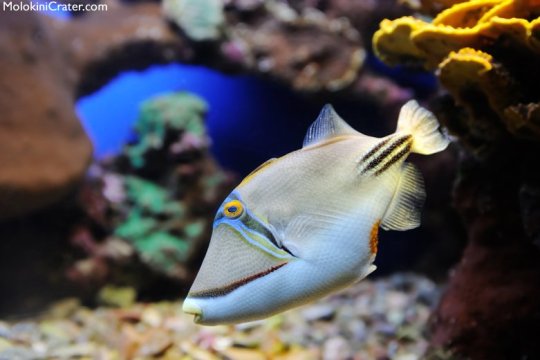
The Reef Triggerfish, also known by Hawiian name humuhumunukunukuāpuaʻa, and scientific name Rhinecanthus rectangulus, is known for its prevalence across the indo-pacific, and for being Hawaii's state fish! Their range stretches from the Hawiian islands to the Eastern Philippines,Northern Australia, Indian ocean, small sections of the red sea, and the mediterranean. This fish lives its life out along reefs and other sea shelves, as their hunting style consists mostly of digging in the sand and rocks for prey, similar to pigs digging for truffles. Their diet consists of reef invertebrates, algae, small crabs, sea urchins, and other benthic animals. This diet can support them to sizes of 10-12 inches, which is the smaller range for triggerfishes.
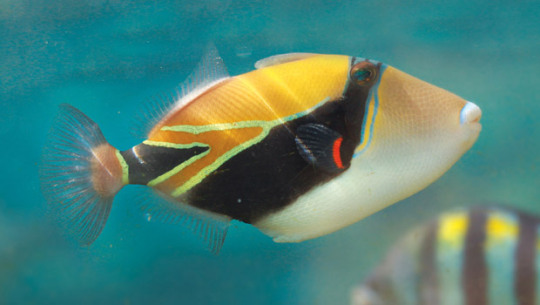
These fish, like many other triggerfish, gain their name from their ability to fire and aim jets of water, which it will also use to hunt and find prey beneath the surface. They also will use this against other fish and larger beings in their territory, as reef triggerfishes are intensely territorial, and solitary other than in breeding season. This can manifest in cases where reef triggerfish chase and bite humans viewing reefs. When met with predators, the reef triggerfish, similar to other triggerfish, finds small holes within rocks or corals that it will lodge itself within. The first dorsal spine will act as a physical barrier that can lock in an upright position, making it harder for predators to pry it out of their safe havens. Due to the shape of their spines and fins, these fish can swim forward, backward, and hover in the water.
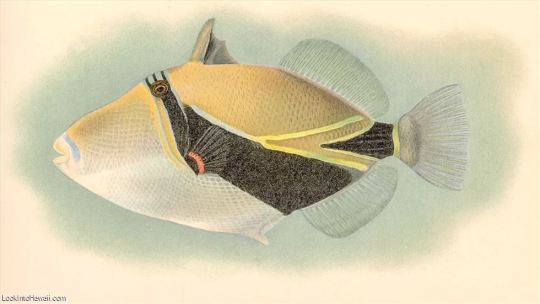
Like most fishes, reef triggerfish have a breeding season from April-August, and classically have females lay eggs and males fertilize in groups. This being the one of the only times they interact with other of their species intentionally. Then after this, a female will build a nest, and wait with eggs until a few weeks after they hatch, at which point the fish will set out independently. Reef triggerfish can also change coloration, turning a more vibrant shade for breeding seasons. They will also present vibrantly when healthy, sexually mature, and unthreatened. They can also change colors to better match an environment around them, and do so nightly when they settle into holes to rest.

Have a wonderful day, everyone!
#fish#fish of the day#fishblr#fishposting#aquatic biology#marine biology#animal facts#animal#animals#fishes#informative#education#aquatic#aquatic life#nature#river#ocean#reef triggerfish#triggerfish
58 notes
·
View notes
Text
🐠 Daily Fish Fact: 🐠
Lagoon Triggerfish moves through the water by using waving motions in its dorsal and anal fins, allowing it to move more precisely. Using these movements, it can move forwards, backwards or simply hover in place above the reef. This means that it can more easily back out of crevices than other unidirectional fish.
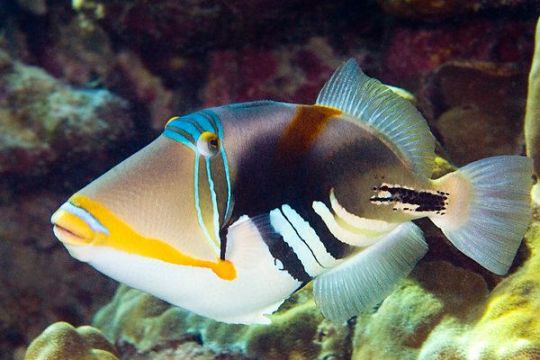
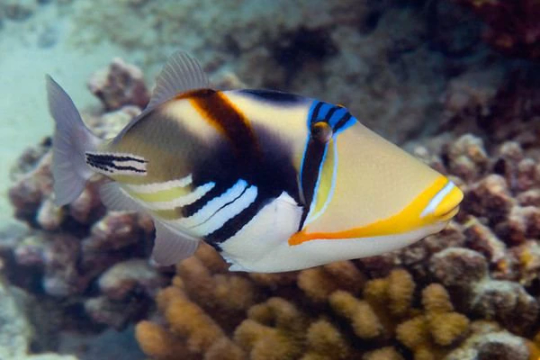
#lagoon triggerfish#triggerfish#fish#fish facts#daily fish#daily fish facts#facts about fish#ocean#marine#ocean life#marine life#marine fish#ocean fish#sea creature#marine animals#marine biology#shark blog#respect the locals#fish post
97 notes
·
View notes
Text

fish 268 - spotted oceanic triggerfish
for the fishuary day 5 prompt - triggerfish!
see the prompt list here
107 notes
·
View notes
Text

Blue triggerfish (Pseudobalistes fuscus), Egypt, Red Sea
Photo by Georgette Douwma
#Pseudobalistes fuscus#Pseudobalistes#blue triggerfish#triggerfish#fish#blue#blue fish#red sea#coral#coral reef#reef#reef life#marine#marine life#sea#ocean#colorful fish#marine animals#nature#wildlife
97 notes
·
View notes
Text
Day 5 of @fish-daily's Fishuary: triggerish
I chose the Picasso triggerfish because it looks neat.

[Image ID: drawing of a picasso triggerfish. it has lots of yellow, grey, and blue lines.]
#Rhinecanthus#fish#artist described#image id#art#marine biology#ocean#illustration#illustrator#picasso triggerfish#fishuary#fishuary2024
38 notes
·
View notes
Text

Marine Encyclopedia - The Gabbiano
Endless Ocean, Nintendo Wii
idk why but i love the way scruffy eo1 creatures look... they look like those cheap plushies that have their designs and faces printed on
#endless ocean#endlessocean#endless ocean 1#endlessoceanphotos#nintendo wii#wii#marine encyclopedia#gabbiano#sailfin tang#yellow tang#goldeye rockfish#samurai squirrelfish#undulate triggerfish#clown triggerfish#naso tang
13 notes
·
View notes
Text

fishuary day 5 - lei triggerfish
(@fish-daily)
#fishuary2024#fish#fish art#triggerfish#lei triggerfish#traditional art#sketchbook#ocean life#tee's art
12 notes
·
View notes
Text
Fishuary day 5, triggerfish,I drew a red tooth/niger triggerfish,very excited for catfish/pleco next :3



#fishuary2024#fish art#fish#triggerfish#red toothed triggerfish#niger triggerfish#sea animals#ocean life#honestly not to proud of this one
3 notes
·
View notes
Text
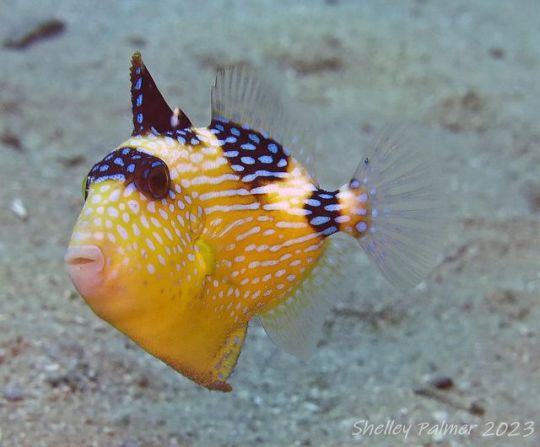
Blue Triggerfish (Pseudobalistes fuscus), juvenile. family Balistidae, Hurghada, Egypt
photograph by Shelley Palmer
166 notes
·
View notes
Text

Character design based on a very silly lookin’ fish. Very ready for crit on this one because it’s so outside of what I usually do. She doesn’t have a name since I was only going for looks, but who knows what the future may hold.
#my own art#digital art#illustration#artists on tumblr#character design#ocean#tropical fish#triggerfish
3 notes
·
View notes